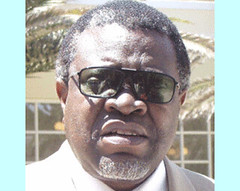
Hage Geingob, Minister of Trade for the Republic of Namibia, says that Africa can teach other nations about national reconciliation. Geingob has served in government for many years.
Originally uploaded by Pan-African News Wire File Photos
15 Oct 2010
WINDHOEK – Africa is a good example of how hostile nations or people can renew friendships and work together for the common good of the country, Dr Hage Geingob, Minister of Trade and Industry told the UNESCO executive board meeting in Paris, France this week.
Geingob said Africa can teach the rest of the world a thing or two about rapprochement because this is a continent that experienced colonialism, exploitation, as well as slavery, yet it did not exact revenge on Europeans after independence.
“Look at Namibia, South Africa, and Zimbabwe. We reconciled with them but they still have difficulty reconciling with us. Africa has an enormous capacity to forgive. I ask you: Does the West?” Geingob asked.
Namibia’s experience is very relevant because it did not have social cohesion at the time of independence, he said.
“We had to create social cohesion, then safeguard it, strengthen it and build peace on it,” Geingob said in his address to the 185th Session of the Executive Board of UNESCO (United Nations Educational, Scientific and Cultural Organisation).
He presented a paper to a meeting, which had the theme ‘Intercultural dialogue in the 2010’s: Revisiting Policies within the context of a culture of peace’.
He said there has never been a greater need for rapprochement than today where the 21st century is characterised by globalisation, clash of civilisations, terrorism, economic meltdown, and social and financial inequity.
These challenges started with competition for the market share, resources, and jobs on the one hand, and religious extremism on the other.
“We will without doubt overcome the challenges posed by globalisation, but resolving conflict across religions, cultures, and civilisations would need a deep transformation in our approach and our mindset,” said Geingob.
Making use of Namibia’s example Geingob said the apartheid regime of South Africa ruled the country with whites enjoying all the privileges, and the rest of the society segregated, stratified and oppressed.
The first task of the post-independent Government was to reconcile this society in subtle as well as obvious ways. The process started in 1989 with the election of members of the Constituent Assembly. Geingob was the first Chairman of the Constituent Assembly. As the chairman, he noticed suspicions between representatives of the white community and blacks, with each camp being suspicious of the other.
Yet, the suspicions were eliminated through dialogue.
“Through dialogue, we arrived at a shared vision. Fear of the unknown was melting away,” he said.
Turning to Africa Geingob said Africa is doing something right.
“That is why we are willing and anxious to share our experiences to build and strengthen peace, and rapprochement built on the rock of fairness and inclusively,” said Geingob.
No comments:
Post a Comment